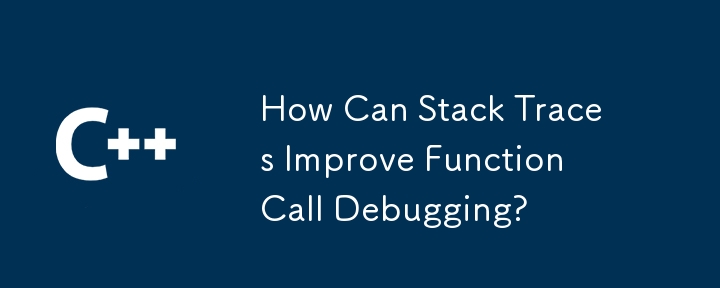Home >Backend Development >C++ >How Can Stack Traces Improve Function Call Debugging?
How Can Stack Traces Improve Function Call Debugging?
- Barbara StreisandOriginal
- 2024-12-23 17:28:101007browse

Using Stack Traces to Debug Function Calls
In software development, understanding the call stack is crucial for debugging errors. This process involves printing out the call stack whenever a certain function is invoked.
For instance, consider the following C function:
void foo() {
print_stack_trace(); // Prints the call stack
// Function body
}
By leveraging this technique, developers can gain insights into the sequence of function calls that led to specific events or errors. In this manner, debugging becomes simpler and more efficient.
Moreover, some libraries allow dynamic registration of functions for stack trace monitoring. Using an API like register_stack_trace_function(foo), one can trigger stack trace printing whenever foo is invoked.
Standard C Library Support
Unfortunately, the standard C and C libraries do not offer any built-in functions for straightforward stack trace printing. However, there are several open-source tools and techniques that can be employed for this purpose.
Open-Source Tools
A variety of open-source libraries provide functions for stack trace printing and analysis. Some notable examples include:
- Boost stacktrace: Offers portable stack trace functionality, including line number and function name retrieval.
- GDB scripting: Allows for controlled execution of GDB commands to obtain stack traces from within programs.
- libunwind: A low-level library for unwinding the stack and obtaining stack frames.
The above is the detailed content of How Can Stack Traces Improve Function Call Debugging?. For more information, please follow other related articles on the PHP Chinese website!
Related articles
See more- C++ compilation error: A header file is referenced multiple times, how to solve it?
- C++ compilation error: wrong function parameters, how to fix it?
- C++ error: The constructor must be declared in the public area, how to deal with it?
- Process management and thread synchronization in C++
- How to deal with data splitting problems in C++ development

